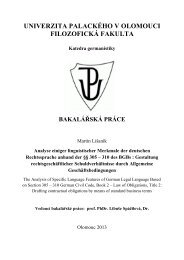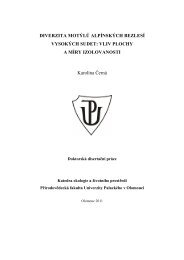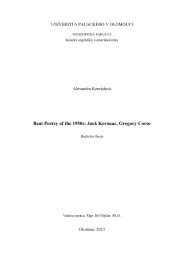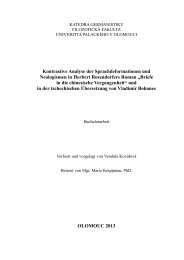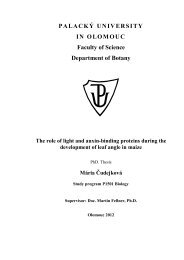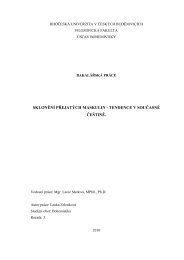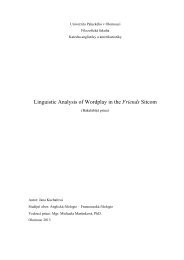Create successful ePaper yourself
Turn your PDF publications into a flip-book with our unique Google optimized e-Paper software.
«condurrà in tutta la verità», prendendo da ciò che è di Gesù e glorificandolo<br />
(16,13-15). R.E. Brown vede l’accenno allo Spirito santo anche nell’amore<br />
che deve dimorare, come Gesù stesso, nei discepoli 360 . In 17,26 Gesù non<br />
dice che a manifestare il nome del Padre sarà il Paraclito, ma lui stesso. «È<br />
però chiaro che lo fa mediante lo Spirito, mediante il quale continua ad<br />
essere presente e vicino nella sua comunità» 361 . Ma perché allora Gesù non<br />
nomina il Paraclito, se lo ha menzionato più volte nei discorsi d’addio? A<br />
questa domanda è Ulrich Wilckens che dà una risposta molto illuminata: 362<br />
In questa preghiera si ritrovano tutti i pensieri e i motivi dei discorsi di<br />
commiato – tranne la promessa dell’invio dello Spirito. Ciò si spiega con lo<br />
scopo teologico della preghiera: tutte le affermazioni si concentrano sulla<br />
circostanza che i discepoli di Gesù che restano sulla terra, vengono resi<br />
partecipi del rapporto perfetto tra Padre e Figlio. Come questo avvenga – cioè<br />
mediante l’opera dello Spirito in e tra loro – resta fuori dall’orizzonte della<br />
preghiera. Nei dialoghi con i discepoli, resi inquieti dal distacco, la promessa<br />
della venuta dell’«altro difensore» in sua vece aveva una funzione importante –<br />
tanto che Gesù, parallelamente alla venuta del Paraclito, aveva parlato loro<br />
anche della sua venuta. Lo Spirito trasmette loro la vicinanza con lui innalzato,<br />
nella loro condizione di lontananza da lui. L’intercessione di Gesù per i suoi in<br />
terra è la premessa dell’invio dello Spirito.<br />
360 R.E. BROWN, The Gospel according to John XIII-XXI, 781: «If the last two lines of<br />
26 are compared, it will be noted that the presence of Jesus in the Christian stands in<br />
parallelism with the presence of the love of God in the Christian. This means that Jesus’<br />
presence is dynamic, expressive of love and expressed in love. The medieval scholar<br />
Rupert of Deutz (…) identifies the indwelling love described in 26c (“the love you have<br />
for me”) as the Holy Spirit – clearly a reflection of later Trinitarian theology where the<br />
Spirit is the love between the Father and the Son».<br />
361 R. SCHNACKENBURG, Das Johannesevangelium, III, 225: «Doch es ist klar, dass er<br />
dies durch den Geist tut, durch den er seiner Gemeinde weiter gegenwärtig und nahe ist».<br />
362 U. WILCKENS, Das Evangelium nach Johannes, 268: «Alle wesentlichen Gedanken<br />
und Motive der Abschiedsreden finden sich in diesem Gebet wieder – außer der<br />
Verheißung der Sendung des Geistes. Dies erklärt sich aus dem theologischen Ziel des<br />
Gebets: Alle Aussagen konzentrieren sich hier darauf, dass die Jünger Jesu, die auf der<br />
Erde zurückbleiben, an dem vollendeten Verhältnis zwischen Vater und Sohn Anteil<br />
erhalten. Wie dies geschieht – nämlich durch das Wirken des Geistes in und unter ihnen –<br />
fällt außerhalb des Blickwinkels dieses Gebetes. In den Gesprächen mit seinen Jüngern in<br />
ihrer Abschieds-Irritation hatte die Verheißung des Kommens des “anderen Anwalts” an<br />
seiner Statt ihren wichtigen Platz – freilich auch dort so, dass Jesus parallel dazu von<br />
seinem eigenen Kommen zu ihnen gesprochen hat. Der Geist vermittelt ihnen die Nähe<br />
zu ihm als Erhöhtem in ihrer Situation irdischer Entferntheit von ihm. Die Fürbitte Jesu<br />
für die Seinen auf Erden ist die Voraussetzung der Sendung des Geistes» (trad. it. Il<br />
vangelo secondo Giovanni, 338).<br />
179



